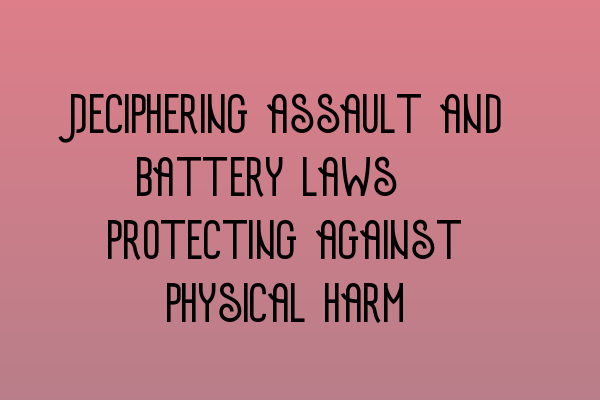Deciphering Assault and Battery Laws: Protecting Against Physical Harm
Assault and battery are two terms frequently used interchangeably, but they actually represent distinct legal concepts. Understanding the difference between these two offenses is crucial for protecting yourself and seeking justice in cases of physical harm. In this article, we will delve into the intricacies of assault and battery laws, clarifying their definitions and outlining the steps you can take to safeguard your rights.
What is Assault?
Assault refers to the act of intentionally causing someone to apprehend immediate physical harm. It is important to note that physical contact is not necessary for an incident to be considered assault. Merely making someone fear bodily harm or violence qualifies as assault under the law.(1)
In order to establish assault, several key elements must be proven. Firstly, there must be an intentional act, which can include verbal threats, gestures, or any other actions that induce fear of immediate harm. Secondly, the victim must have a reasonable apprehension of harm, meaning their fear is justified based on the circumstances. Lastly, the fear experienced by the victim must be immediate, indicating that the threat of harm is imminent.(2)
If you believe you have been a victim of assault, it is crucial to document the incident as thoroughly as possible. Seek medical attention if necessary, gather any witness statements, and contact the authorities to report the occurrence. Seeking legal advice and representation from a qualified criminal defense solicitor is also recommended to navigate the legal process effectively.
If you would like more information about assault laws or require legal assistance, our team at SQE Criminal Law & Practice Law UK is here to help. We have extensive experience in handling assault cases and will provide you with the guidance and support you need throughout the legal proceedings.
Understanding Battery
While assault deals with the apprehension of harm, battery deals with actual physical contact and the resulting bodily harm. Battery occurs when an individual intentionally and unlawfully touches or strikes another person against their will. Unlike assault, battery requires physical contact between the perpetrator and the victim.(3)
In order to establish a case of battery, several elements must be proved. Firstly, the defendant must have intentionally made physical contact with the victim. This can include actions such as hitting, punching, or even spitting. Secondly, the contact must have been non-consensual, meaning the victim did not give their consent to be touched in such a manner. Lastly, the contact must have caused harm or offensive contact for it to be considered battery under the law.(4)
If you have been a victim of battery, it is crucial to prioritize your safety and seek medical attention for any injuries sustained as a result. Reporting the incident to the police and securing legal representation from a knowledgeable solicitor specializing in criminal law can significantly aid your case. When it comes to protecting your rights and seeking justice, our team at SQE Criminal Law & Practice Law UK is dedicated to providing you with comprehensive legal support and assistance.
Protecting Yourself against Physical Harm
Understanding assault and battery laws empowers individuals to protect themselves against physical harm. By familiarizing oneself with the elements required to establish these offenses, individuals can take proactive measures to ensure their own safety and the safety of others.
It is important to note that assault and battery laws can vary between jurisdictions. The legal definitions and penalties for these crimes can differ depending on the specific statutes and case law in your jurisdiction. Therefore, it is crucial to consult with a qualified legal professional who is well-versed in the criminal laws of your jurisdiction.(5)
If you want to delve deeper into criminal law and further enhance your legal knowledge, we offer a range of valuable resources. Our SQE 1 Practice Exam Questions provide the perfect opportunity to test your understanding of criminal law concepts. Additionally, our SQE 1 Practice Mocks FLK1 FLK2 offer comprehensive mock exams to help you prepare for the SQE 1 exams with confidence.
For those aspiring to become criminal law practitioners, our SQE 2 Preparation Courses are designed to equip you with the necessary knowledge and skills to excel in your chosen field. Our experienced tutors will guide you through the intricacies of criminal law, helping you develop a strong foundation and practical understanding.
If you have any questions or require assistance regarding SQE exam dates or SQE 1 and SQE 2 preparation courses, please refer to our comprehensive resources. Our SQE 1 Preparation Courses and SRA SQE Exam Dates sections provide in-depth information to ensure you are well-informed and fully prepared for your examinations.
At SQE Criminal Law & Practice Law UK, we are committed to empowering individuals with legal knowledge and providing exceptional legal services. If you require support in navigating assault and battery laws or any other criminal law matters, please do not hesitate to contact our dedicated legal team. Your well-being and protection are our top priorities, and we will work tirelessly to ensure your rights are safeguarded.
Sources:
(1) SQE 1 Practice Exam Questions
